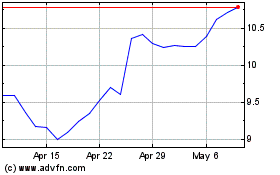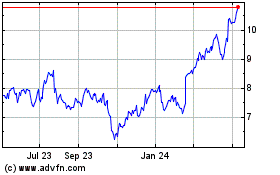U.K. Financial Firms Seek Reassurance After Brexit Vote
September 07 2016 - 1:08PM
Dow Jones News
By Max Colchester and Lucy McNulty
LONDON--The U.K.'s biggest financial groups met Wednesday with
British Treasury officials to continue hashing out a negotiating
position on Brexit, as executives try to reconcile diverging views
on the deal the country should strike with the European Union.
U.K. Chancellor of the Exchequer Philip Hammond hosted chairmen
from a group including Morgan Stanley International, Barclays PLC,
HSBC PLC and the London Stock Exchange to gather information as the
Treasury prepares to negotiate with EU members.
But federating the industry is proving complicated, according to
people familiar with the broader negotiations.
"There are lots of people having all sorts of meetings all the
time, discussing Brexit," says Barney Reynolds, Global Co-Head of
Financial Institutions at law firm Shearman & Sterling. "The
idea of the City having one set of key meetings is just
nonsense."
The chairmen's group, the European Financial Services Chairmen's
Advisory Committee (dubbed "F-SAC" in British banking circles)
isn't alone in lobbying. There are around half a dozen
organizations and trade groups--representing interests from asset
management to insurance--that are trying to get the U.K.
government's ear. Meanwhile big finance groups are also going to
the treasury directly to share their views.
"There isn't a single point of contact," says one official
involved in the banks' lobbying campaign. "And there isn't a single
point of view."
The U.K. financial sector, which employs 2.2 million people, is
jostling for attention from the Treasury along with other
industries. Presenting a clear negotiating position is important to
ensure key demands are met, analysts say.
It's unclear when the Brexit negotiations will start in earnest.
Once the U.K. officially requests to leave the EU, a two year
countdown commences. Banks broadly want to keep the ability to
"passport," or sell their goods and services across the EU, and
also want a transition period to ensure they can adjust to any
changes to the status-quo.
Pro-Brexit campaigners, including several from the hedge fund
industry, argued the City should use Brexit to deregulate.
International banks want to keep as much access to the EU as
possible, which would likely come on the condition of free movement
of people and the imposition of EU made rules. Aligning other
interests could prove complex. Small British focused banks, for
instance, don't view passporting as much of a deal breaker. Big
U.S. banks do.
Meanwhile bank executives are under pressure to formulate
contingency plans for Brexit. Many complain that they can't make
plans without more clarity on the type of Brexit the U.K.
wants.
Even within the government there is uncertainty over how the
negotiations will play out.
The U.K.'s newly created Department for Exiting the European
Union, led by longtime EU skeptic David Davis, has primary
responsibility for mapping the U.K.'s path out of the EU. But the
Treasury, with its expertise and links to banks, will play a key
role in negotiations with the EU on financial services, according
to officials. It's not clear how the two will coordinate.
Write to Max Colchester at max.colchester@wsj.com and Lucy
McNulty at Lucy.McNulty@dowjones.com
(END) Dow Jones Newswires
September 07, 2016 12:53 ET (16:53 GMT)
Copyright (c) 2016 Dow Jones & Company, Inc.
Barclays (NYSE:BCS)
Historical Stock Chart
From Mar 2024 to Apr 2024

Barclays (NYSE:BCS)
Historical Stock Chart
From Apr 2023 to Apr 2024
